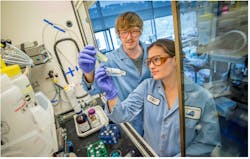Department of Energy Selects 20 Innovators for Entrepreneurship Program
On July 6, the Department of Energy announced they had selected a new batch of cohorts for its Lab-Embedded Entrepreneurship Programs. The 20 researchers selected will receive mentorship opportunities at National Laboratories across the country with the aim of development that could launch new manufacturing or energy opportunities.
According to the Office of Energy Efficiency and Renewable Energy, the LEEP were founded “to provide an institutional home for innovative postdoctoral researchers to build their research into products and train to be entrepreneurs.”
The selected researchers will head to one of three national laboratories to perform their research. Six will go to Argonne National Laboratory and join six teams in the Chain Reactions Innovations program on computing, cybersecurity, smart manufacturing, or advanced materials. Lawrence Berkeley National Laboratory will welcome 14 new researchers to the seven Cyclotron Road program teams researching manufacturing, advanced materials, electrification, and building efficiency, and the other six cohorts will join the Innovation Crossroads program at Oak Ridge National Laboratory to research cybersecurity and efficient computing, plus additive and smart manufacturing.
According to the Office of Energy Efficiency and Renewable Energy, the program gives select post-doctoral researchers the chance to perform novel development research and trains them in entrepreneurial skills. “This dual focus on early-stage R&D and entrepreneurial development provides innovators with the platform they need to take their ideas from the lab and onto the commercialization pathway,” says the Office’s website.
A number of the research fields pursued by the cohorts have their roots in advanced manufacturing technology, and range from . Christopher Passolano of the Illinois Institute of Technology is studying silicon-based rechargeable batteries, and Karin Calvinho of Rutgers University is pursuing the conversion of waste carbon dioxide to plastic. Joshua McEnaney and Jay Schwalbe, both from Stanford University, are both researching how to efficiently synthesize nitrogen fertilizer out of air, water, and electricity.
Since 2015, the LEEP programs have awarded more than $32 million to 89 fellows and was part of 65 projects. According to the Department of Energy, previous participants have gone on to attract more than $120 million in federal and private funding from investors.
About the Author
IW Staff
Find contact information for the IndustryWeek staff: Contact IndustryWeek
